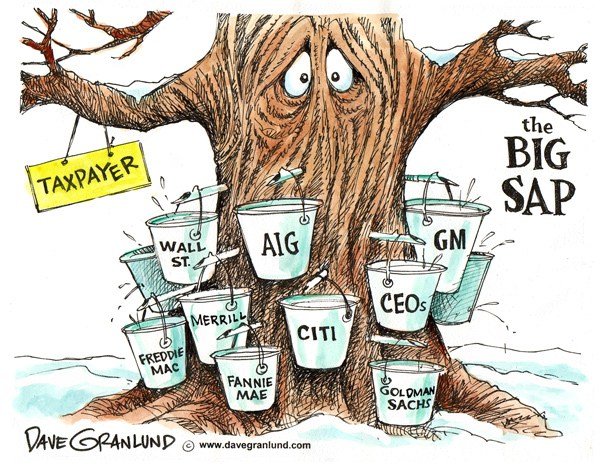Towards Voluntaryism (Part 24)
3.7. Government: Taxation Issues
Towards Voluntaryism (Part 24)
Unlike the preceding sections, the following treatment of taxation is not formulated as legislation but rather as a set of general guidelines. What follows could, I believe, only be successful with a significant transformation of the education system as postulated in Towards Voluntaryism parts 4-16 that would enable the individual to fully appreciate their role in fostering and maintaining a society built on mutual respect and responsibilities. It would also most certainly not be possible without the successful enactment of Articles 1-5 as postulated in Towards Voluntaryism parts 19-23, which provide a means to ensure that public servants serve the best interests of their communities.
Participative Decision Making in Expenditures
Taxation with insufficient representation must be eliminated by empowering taxpayers to determine what their tax revenues will or will not be spent on. Merely having an elected representative and their appointed functionaries in office as trustees and managers of tax dollars is, I contend, insufficient to qualify as adequate 'representation' in the modern era.
Prior to the internet age, elected public servants and their appointees may have been the best government had to offer in to terms of managing and directing the flow of tax dollars as trustees and representatives of the will of the people. That is no longer the case. Current technologies make possible ideas that prior to the digital era would have been wholly impractical.
As such, I propose that a participatory system be created that enables taxpayers to personally and individually determine how their tax dollars are spent. Initially, expenditure categories would encompass non-essential government functions and over time all tax expenditures would be phased in as constituencies became accustomed to the system.
This system would, presumably, be best initiated at the local municipal level and move up the constituency hierarchy from there (municipal-county-state-federal). I contend that the advent of such a system would combat corruption, lower taxation and promote societal cohesion.
This last consideration is one that deserves to be expounded upon. I contend that higher taxation correlates with reduced feelings of personal responsibility to - and participation in - society. I also hold that governmental assumption of the individual's responsibilities to society and the resources they need to affect positive change in their communities as they see fit is ultimately toxic to societal cohesion and functionality.
The following suggestions are aimed at enabling accurate representation of the tax payers' will and enforcing accountability on the part of those who manage their tax dollars. The following suggestions presuppose a transparent ledger of government expenditure categories and an internet platform where taxpayers can log on and participate in expenditure distribution:
General Guidelines for a Participative Tax Framework
Expenditure categories and subcategories for tax dollars should be provided to tax payers. See The National Priorities Project for an idea of how the main categories would look.
Tax payers could put a check mark next to expenditure categories they are willing to fund with their tax dollars.
Expenditure categories could be ranked by importance to the tax payer or the tax payer could choose what percentage of their tax dollars are to be dedicated to said category.
Tax payers should be able to indicate which expenditure categories should not receive any funds.
Unallocated funds are to be used to fund critical infrastructure first then social benefits second as determined by duly elected representatives.
Tax payers can opt out of this process and funds are allocated as normal.
A certain percentage of tax dollars could be set aside to ensure a functioning government. If adhering to early suggestions (see 3.5. Government: Salary & Wage Revision for Public Servants), this sum could be precisely calculated annually and would be reduced drastically from current levels.
Property taxes
Property taxes should be eliminated entirely and all expenditure categories funded by property taxes should be funded by other means. Property taxes are the most nefarious of all taxes, as they entail that property one has bought and paid for, sometimes for decades, can be confiscated if one falls into arrears.
If you have to pay taxes on your property, you are de facto a renter, not an owner. If you disagree, try not paying your property taxes and see just how long you will be allowed to maintain possession of your property.
Eliminating property taxes should be a primary concern of every property owner or aspiring property owner. If Articles 1-5 as postulated in Towards Voluntaryism Parts 19-23 are successfully enacted, eliminating property taxes would be greatly facilitated.
...
Next: Towards Voluntaryism (Part 25) - Jury Nullification

.
.
.
Shot with a golden arrow,

Cupid Zero
.
I consider requests to write on a topic of your choice.
.
Don't forget to upvote, follow and resteem! Comments always appreciated.
.
.
.
.
.
.
.
.
.
.
.
.
.
If you aren't on Steemit, please consider supporting my work with a gift of:
Bitcoin: 1fruAGn9JcKqJJscreUpS2XurfLzksBe8
Litecoin: LQf19ExcdSFDjYj6NktRgzBnJ7NScVgikA
Ethereum: 0xEe3005b1D2D8963a85E1Ca4ff511acCd98A1E29D

